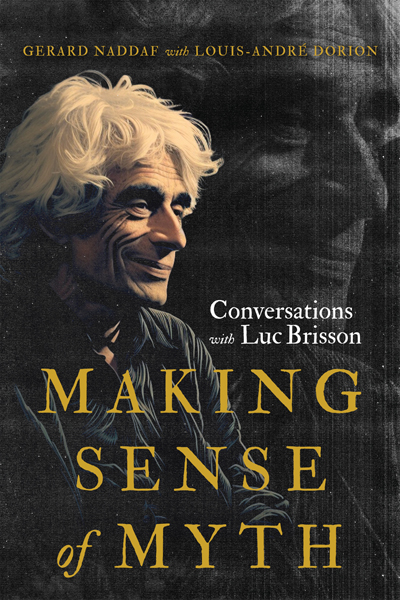Gerard Naddaf, Professor Emeritus of York University’s Department of Philosophy, has published a new book with McGill-Queen’s University Press that explores the importance of myths as creators of selfhood and group identity throughout history.
To most, myths are merely fantastic stories. But for Luc Brisson, one of the great living Plato scholars and prominent philosophers of his generation, myth is a key factor in what it means to be human – a condition of life for all. Essential and inescapable, myth offers a guide for living, one that illuminates our need for belonging and group identity.
In these free-flowing conversations, Brisson provides a lucid historical analysis of why the history of his native Quebec is inseparable from that of the Catholic Church in Quebec society, and the links he draws here provide a perfect paradigm of myth and mythmaking. Ultimately, Brisson seeks to explain how his work on myth corresponds with his own biographical path, which, as he shows in these conversations, was itself rooted in Catholic and Quebecois myth. But we soon see that his theory of myth and its practical application is relevant to all people, regardless of one’s particular background.
Brisson begins these conversations with an overview of his genealogy before turning to the story of his escape from an all-encompassing myth promulgated by the Roman Catholic Church of his youth. The myth(s) that made Brisson who he is are thus front and centre here. We learn of his recruitment by a Catholic seminary as a gifted (but handicapped) child from a modest rural Quebec family at age eleven, the emotional and intellectual awakening he subsequently underwent, and his own “noble lie,” which allowed him to get an education that he would not have otherwise received. There is something for everyone here, but the book offers first and foremost a philosophy of myth that doubles as a philosophy of life.
The earlier conversations originally recorded in French (with Louis-André Dorion) contain some of the most insightful ideas on the origin of bisexuality. There’s also ample coverage of Brisson’s Orphic research, and a rich discussion of why the big bang is still a myth on a par with Plato’s Timaeus. Brisson’s world travels, his decades living in Paris, and his deep immersion in Quebec culture and politics also occupy a prominent place here, but always in the background is Brisson’s attention to myth and, by extension, politics.

In later conversations (part 4), Brisson offers insightful observations on a wealth of topics, including what he sees as the illusory nature of originality; the constraints of the publish-or-perish phenomenon in academia; his experience working in teams; his and others’ interpretations of Plato; the differences between Greek and Abrahamic religions; the place of myth in the modern world; and his theory for why reason will always be tied to myth – to mention but a handful of the themes touched on here.
It’s the final section of part 4 that brings together the whole. Myth, as Brisson understands it, comprises stories that give us our identity; they offer us a way of unconsciously (until Plato, that is) controlling the individual within the community to which he or she belongs. As such, myths are creators of the self, of one’s identity. The notion of individuality is a kind of mirage, then; it’s as if there is no self independent of one’s larger group or community. For Brisson, myth is a phenomenon that few have given any real thought to, and yet it’s a key to understanding what it means to be human, and to the future destiny of humanity itself.
This book is meant to appeal to an intellectually curious English-reading public (and not just scholars and philosophers). To this end, the text is interspersed with over three hundred notes adding necessary context. Naddaf also provides an introduction and an afterword. The former puts Plato and myth into context, giving readers a sense of what to expect in the conversations; while in the latter, he describes the role of myth in anthropogeny (from the origins of language), in the evolution of the self and of consciousness (culminating in the creation of the Western mind), and in multiculturalism. However, while the book offers copious historical analysis, he also engages throughout with the role of myth in the current political and social climate, including its place in contemporary world events.
Gerard Naddaf is Professor Emeritus and Senior Scholar in the Department of Philosophy at York University's Faculty of Liberal Arts & Professional Studies. He is a specialist in ancient Greek philosophy, particularly of the origins of philosophy and science, the Presocratics, and Plato. His most recent work focuses on the role of myth (and consciousness) in the evolution of the self, as well as how inspiration influences human creativity. His work has been cited more than a thousand times by scholars in a range of fields and has garnered tens of thousands of views from readers in over 160 countries on online platforms like Academia.edu and Google Scholar. This is exactly the type of broad audience that his latest book, Making Sense of Myth: Conversations with Luc Brisson (McGill-Queen's University Press),is directed at.
